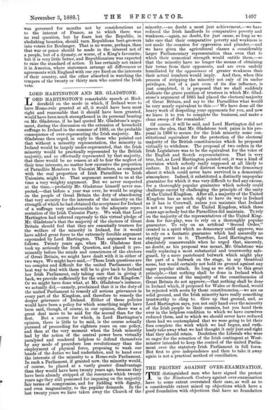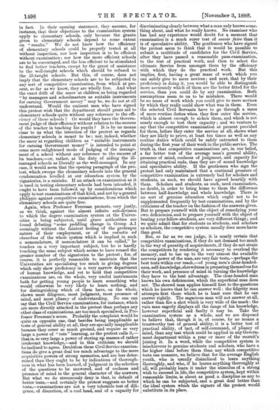THE PROTEST AGAINST OVER-EXAMINATION.
THE distinguished men who have signed the protest in the Nineteenth Century against over-examination have to some extent overstated their case, as well as to a considerable extent mixed up objections which have a good foundation with objections that have no foundation in fact In their opening statement, they assume, for instance, that their objections to the examination system apply to elementary schools, only because the grants given to elementary schools depend to some extent on " results." We do not know how the efficiency of elementary schools could be properly tested at all without inspection, nor how inspection is to be efficient without examination ; nor how the more efficient schools are to be encouraged, and the less efficient to be stimulated to find better teachers, except by the grant of assistance to the well-taught schools which should be refused to the ill-taught schools. But this, of course, does not imply that the elementary schools are to be subjected to any sort of competitive examination, from which at pre- sent, so far as we know, they are wholly free. And what the exact drift of the sneer at children as being regarded " by managers and schoolmasters as suitable instruments for earning Government money " may be, we do not at all understand. Would the eminent men who have signed this protest wish that the department should grant aid to elementary schools quite without any reference to the effi- ciency of those schools ? Or would they have the Govern- ment judge of their efficiency without relation to the success of the teacher in teaching his pupils ? It is by no means clear to us what the intention of the protest as regards elementary schools is meant to be ; nor, indeedi. whether the sneer at regarding children as " suitable instruments for earning Government money" is intended to point at some more enlightened mode of judging of the manage- ment of a school without any reference to the success of its teachers,—or, rather, at the duty of aiding the ill- managed schools as liberally as the well-managed. In any case, it would seem that the opening paragraph of the pro- test, which sweeps the elementary schools into the general condemnation levelled at our education system by the signatories, is a mistake. If an attack on examination as it is used in testing elementary schools had been intended, it ought to have been followed up by considerations which apply to test examinations of that kind, and not by. a.general philippic against competitive examinations, from which the elementary schocds are quite free. Again, when Professor Freeman protests, very justly, as we think, against the almost infinite sub-division to which the degree examination system at the Univer- sities is being subjected, until grave authorities are found. debating " some pedaling change in Group A.1 seemingly without the faintest feeling of the grotesque nature of their employment, or of the redv,ctio ad absurdwrn of the whole system which is implied in such a nomenclature, if nomenclature it can be called," he touches on a very important subject, but he is hardly touching the same subject which seems to have roused the greater number of the signatories to the protest ; for, of course, it is perfectly reasonable to maintain that the Universities are specialising too much in giving• degrees which only show proficiency in a very narrow• department of human knowledge, and yet to hold that competitive examinations are, on the whole, very useful instruments both for getting young people to learn something wha would otherwise be very likely to learn nothing, and for distinguishing which of them have, on the whole, shown most diligence, most judgment, most presence of mind, and most pliancy of understanding. No one can say that the Civil Service examinations, for instance, which are more directly attacked in the protest than perhaps any other class of examinations, are too much specialised, in Pro- fessor Freeman's sense. Probably the complaint would.be quite an opposite one, that besides being inapplicable as tests of general ability at all, they are specially inapplicable because they oover so much ground, and require so very large a power of " rote " learning, as.the protest: calls it,— thatis, so very large a power of storing up masses of rather irrelevant knowledge,—and in this criticism, we should be inclined-to agree. Doubtless these Civil Service examina- tions do give a great deal too much advantage to the mere acquisitive powers of strong memories, .and are less deter- mined than they ought to be by indications of thorough- ness in what has been learned, of judgment in the selection of the questions to be answered, and of coolness and presence of mind in the general character of the answers. But what we do strenuously deny is that, in default of better tests,—and certainly the protest suggests no better tests,—examinations are not a very tolerable test of dili- gence, of discretion, of a cool head, and of a capacity for discriminating clearly between what a man only Imows some- thing about, and what he really knows. No examiner who has had any experience would doubt for a moment that examination is a much surer test of savoir faire than it is of speculative ability. The gentlemen who have signed the protest seem to -think that it would be possible to submit a multitude of candidates for the Civil Service,, after they have passed a reasonable pass-examination, to the test of practical work, and then to select the ultimate Service from amongst them by the efficiency with which they do the practical work. But this implies, first, having a great mass of work which you can safely give to mere novices ; and next, that by their proficiency in doing it, you would be able to distinguish more accurately which of them are the better fitted for the service, than you could do by any examination. Both assumptions seem to us to be mistaken. There would be no mass of work which you could give to mere novices by which they really could show what was in them. Even the selected Civil Servants have to go through a mass of mere routine duties when they first enter the service, which is almost, enough to sicken them, and which is not nearly enough to test their capacity ; and we venture to say that the competitive examination at present provided for them, before they enter the service at all, shows what they are likely to prove, at least ten times as well as, any routine duties which could be safely entrusted to them during the first year of their work in the public service. The truth is, that competitive examinations are, in our belief, a far better test of the average man's general ability, presence of mind, coolness of judgment, and capacity for attaining practical ends, than they are of sound knowledge and speculative ability. If the gentlemen who sign the protest had only maintained that a continual pressure of competitive examination is extremely bad for scholars and students, as such, we should have agreed heartily with them. Scholars and students, as such, need. examination, no doubt, in order to bring home to them the difference between half-knowledge and whole knowledge. There is no sort of genuine education which ought not to be supplemented frequently by test examinations, and by the criticieansof, the teacher on. the fashion of the answers given. But to prepare yourself with the object of remedying your own deficiencies, and to prepare yourself with the object of beating your fellow-students, are very different things.; and. we quite admit that for students as students, and scholars as scholars, the competitive system usually. does more harm than good..
But, so far as we can judge, it is nearly certain that competitive examinations, if they do not demand too much in the way of quantity of acquirements, if they do not strain the competitors by rendering it necessary to overload the memory, and to use up to the very utmost the available nervous power of the man, are very fair tests,—perhaps the best tests within our reach,—of young men's clear-headed- ness, self-knowledge, shrewdness in preparing themselves for their work, and presence of mind in turning the knowledge they have to the best advantage. The clear-headed man knows his own deficiencies, which the superficial man does not. The shrewd man applies himself first to the questions which he knows that he can answer well : the fidgetty man attempts first those which, he is least sure that he can answer rightly. The sagacious man will not answer at all, rather than fire a shot which is very wide of the mark : the vain man eagerly displays all the range of his knowledge, however superficial and faulty it may be. Take the examination system as a whole, and we are disposed to believe that, though it is, of course, by no means a trustworthy test of general ability, it is a better test of practical ability, of tact, of self-command, of pliancy of mind, than any test which could• be applied in any. Govern- ment department within a year or more of the recruit's, joining it In a word., -while the competitive system is mischievous to genuine students and scholars, who have a far higher ideal before them than any which competitive tests can measure, we believe that for the average English youth, who is usually disinclined to learn anything, thoroughly, and who, if he learns- anything thoroughly at all, will probably learn it under the stimulus of a strong wish to succeed in life, the competitive system, kept within reasonable limits, is about as good a discipline as any to which he can be subjected, and a great deal better than the ideal system which the signers of the protest would substitute in its place.



















































 Previous page
Previous page